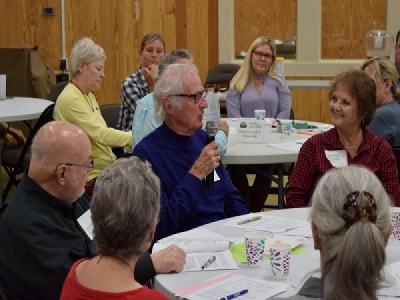
Posted on November 20, 2018
Exemplified by recent flooding after Hurricane Florence, experts say global warming and rising sea levels are causing continuous issues in coastal counties of the United States.
Georgetown County residents, with help from the federal government, are working to find solutions to flooding with a series of interactive workshops where residents play active roles.
Pamela Martin of Pawleys Island, a professor at Coastal Carolina University, is executive director of Georgetown RISE, an organization dedicated to Resilience, Innovation, Sustainability and Education in Georgetown County. That organization recently led a role-playing workshop during the Murrells Inlet 2020 Chowder Talk. Maeve Snyder, a CCU alumna, is the education task force coordinator for Georgetown RISE and Coastal Training Program coordinator with North Inlet-Winyah Bay National Estuarine Research Reserve.
Similar workshops are planned for Thursday, Nov. 29, from 6-7:30 p.m. in the Plantersville Community Center west of Georgetown; and on Wednesday, Dec. 5, from 3-5 p.m. at the CCU office in downtown Georgetown.
As part of a $100,000 National Oceanic and Atmospheric Administration Scientific Transfer grant, these interactive workshops are an opportunity to discuss the issue of flooding in Georgetown County. Participants will simulate community planning and decision making in small groups; and will gain familiarity with flooding impacts and solutions, how community decisions are made, and the trade-offs and challenges involved.
“Georgetown County has experienced a major storm or flood every year for the past four years. These events disrupt lives and jobs, damage homes and health, and result in lost business revenue, school days and more.” Martin said. “Participants in these workshops will have the opportunity to share their reflections and experiences with recent flooding. Feedback from this workshop will be shared in a report to the general public and county leaders.”
Anyone is welcome to attend the workshops, including concerned citizens, government staff, business owners, community leaders, students, etc., Martin said. Attendees will discuss a fictitious place called Riverway County, which is very similar to Georgetown County.
The City of Maurens, like Georgetown, is a small historic port city built on the Eastern Bay; the rural town of Byways, like Andrews, is in the northwestern part of the county; and Eastern Island, like Pawleys Island, is a barrier island that has been incorporated into a town. The roles played by workshop attendees are: Riverway County director of sustainability; Mayor of Byways; superintendent of schools; executive director of Maurens Business Alliance; a Gullah-Geechee small business owner, artist and environmental activist; and an Eastern Island beach property owner, who is a former town council member.
“Together, you represent a broad range of interests and experiences in Riverway County,” the workshop instruction packet states. “As you work together, you should attempt to balance your need to advocate for the issues that matter to you and the people you represent with the need for group consensus in order to apply for federal funding.”
The projects groups will discuss are: (1) replace storm water and sewer pipes to reduce inland flooding; (2) Maurens city improvements, including sewer pipes and waterfront protections; (3) coastal restoration study to evaluate the economic risks of sea level rise on the county and likely effectiveness of restorative projects on Eastern Island; (4) managed retreat study to evaluate the impact of a long-term managed retreat policy on Eastern Island; (5) dredging the harbor in the city of Maurens to provide sufficient depth for large boats for fishing and commercial tourism; (6) review of conservation and heritage lands, mapping lands and identifying challenges; (7) public health and safety study and communications campaign to evaluate risks, determine who is most vulnerable to these risks and make recommendations for policies and projects that could reduce those risks.
“What we are trying to document is what you want long-term moving forward so that we make sure what is important to Georgetown County stays in Georgetown County, so your voices are heard — not just the climate numbers but what you as human beings want,” Martin said. “This is a tool that gives us an advantage that we need to use moving forward. Georgetown County has an opportunity to be a role model for being a resilient coastal community.”
The Plantersville Community Center is located at 1458 Exodus Drive, Georgetown, SC. Coastal Carolina University Georgetown Campus is located at 903 Front Street, Georgetown.
Source: South Strand News





